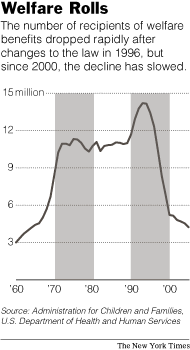New Rules Force States to Curb Welfare Rolls

From the New York Times:
The Bush administration plans to issue sweeping new rules on Wednesday that will require states to move much larger numbers of poor people from welfare to work.
The rules, drafted in response to a budget signed into law by President Bush in February, represent the biggest changes in welfare policy since 1996, when Congress abolished the federal guarantee of cash assistance for the nation's poorest children.
Since then, the number of welfare recipients has plunged more than 60 percent, to 4.4 million people, from 12.2 million. Most of the decline occurred in the first years, before the 2001 recession. Federal and state officials say they expect the new rules to speed the decline in welfare rolls, which has slowed in recent years.
The rules are far more than a bureaucratic application of the new law, passed after four years of partisan deadlock. For the first time, they set a uniform definition for permissible work activities and require states to verify and document the number of hours worked by welfare recipients.
Nationally, in 2004, the last year for which official figures are available, about 32 percent of adults on welfare were working. Under the new rules, 50 percent of adult welfare recipients must be engaged in work or training in the fiscal year that starts Oct. 1, or states will face financial penalties. The penalties can reduce a state's federal welfare grant by 5 percent in the first year and by two additional percentage points for each subsequent year of noncompliance, up to a maximum penalty of 21 percent.
Some state officials and antipoverty groups, including many who opposed the 1996 law, say the new work requirements are unrealistic.Click here to read the full article.
--Tom Hayes



0 Comments:
Post a Comment
<< Home